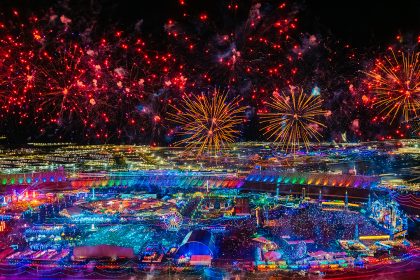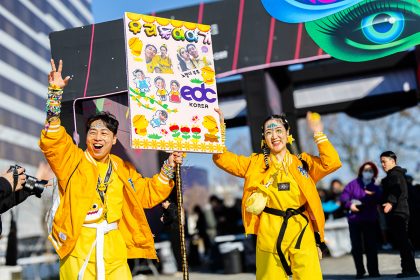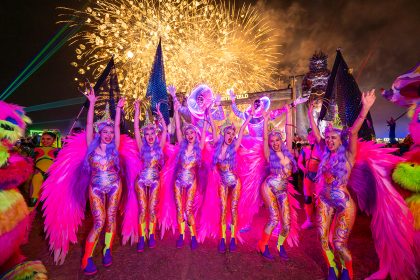Frontlines of Compassion: The Night I Teamed Up With Ground Control
If you’ve been to an Insomniac event in the past eight years, you will have likely come into contact with a chipper group of young ravers clad in purple, dispersed around the crowd, handing out water and boosting vibes. Ground Control—the first layer of care and the eyes and ears of the health & safety operations for all Insomniac festivals—has grown to become one of the most important aspects of our operations on the ground.
Ground Control is not a typical festival role. Aside from being an active participant in the scene, team members need to wear their compassion on their sleeve. Beginning back in February for this year’s EDC Las Vegas, the recruitment process required all applicants to submit a résumé and brief essay detailing why they are right for the role. The chosen staff are then onboarded by a number of dense info packs and an eight-hour training session the Thursday before gates open. The program has swelled so much in popularity in recent years, that in 2018, they overstaffed with qualified candidates and were able to deploy support to other teams.
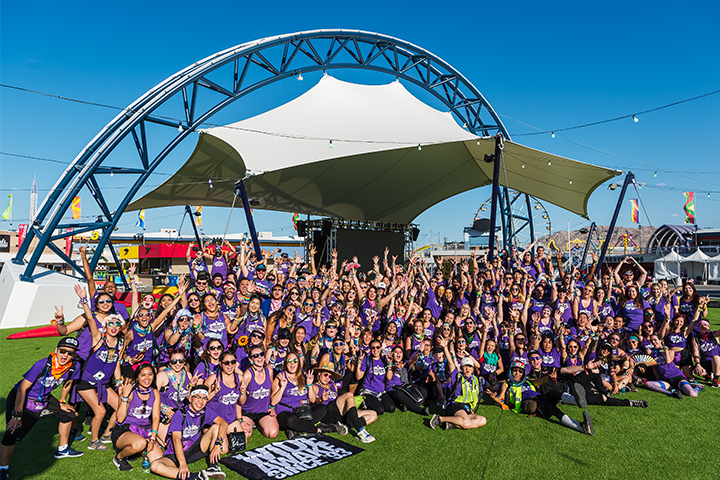
Armed each with a radio, a torch, earplugs, pen and paper, gloves, maps, and a retractable lightsaber—which they ingeniously use for flagging down security—Ground Control troops are paired up and sent off into the night on 12-hour shifts.
When I came to meet her on Saturday night, Ground Control founder Laura Newton hadn’t left the control room all night. The Long Beach native was clad in her team’s trademark purple and calmly presided over the operation she first conjured up as an 18-year-old back in 2010.
After the final EDC Los Angeles, Laura was talking with her best friend’s father and his friend Alyxzander Bear, Insomniac’s head of production. “I told them, ‘There needs to be a group of people roaming the grounds that are actually approachable, because people are afraid they’ll get in trouble from security.’ Bear then pitched the loose concept to Pasquale in 2010, and he was like, ‘Sure, bring her out to Audiotistic, and let’s see if she can actually pull a squad together.’”
She did—40 workers in all. In the weeks after she was invited, she started fleshing out what would become Ground Control, which officially debuted at Beyond Wonderland SoCal in 2011.
This was a pivotal time for Insomniac. EDM was on the brink of becoming the most significant American youth culture movement since grunge, and Insomniac was moving EDC to Las Vegas and doubling down on its efforts to keep its audiences safe in the face of the inhibiting and archaic R.A.V.E. Act. With mass-gathering medical professional Maren Steiner joining the company as its director of Health & Safety, Laura’s Ground Control concept was supported by a strong team driven to innovate their on-site support network.
“It still blows my mind that they gave a 19-year-old that much responsibility back then,” Laura says, shaking her head and smiling. “But I’m glad they did.”
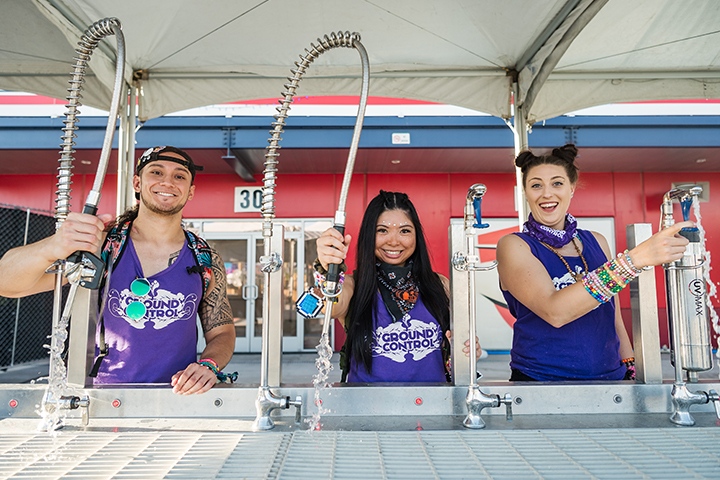
I turned up for my brief shift at 11pm on Sunday night. Weary, beaten, and starting to come down with an ill-timed cold, I was a little concerned about my ability to deliver the requisite levels of pep required to don the purple shirt.
I was paired up with Liz and Mike. Liz is a US Army veteran turned personal trainer. She started with Ground Control at Beyond Wonderland 2017. Mike attended EDC Las Vegas for the first time last year and decided to put in a shift with Ground Control before finishing med school.
Their backgrounds in health, wellness, and festivals made them ideal candidates for the role. “I was drawn to this because I started raving a long time ago, and there was nothing like this back then—back when I was more vulnerable,” Liz explained. “I feel compelled to help the community.”
As we headed out of the command center and back onto the grounds, she told me the main thing to look out for was people slumped in dark corners. She explained that people often try to escape the lights and the noise when they’re feeling unwell. Under the cacophony of the Electric Sky, it’s easy to miss the shadowy spaces on the ground.
Ground Control has labeled certain areas of the festival site as “hotspots,” meaning they generally have a higher volume of people in need of attention. The Oasis behind cosmicMEADOW was the hotspot on our beat. Hidden from the stages and with some turf to sprawl out on, it is a popular location to grab a moment’s respite from the throb of the festival. As soon as we arrived, we saw a trio of young men lying on their backs with their eyes closed.
“There are three things you need to ask a Headliner if they appear to be intoxicated or altered: their name, where they are, and who the president is.”
I watched as Liz and Mike crouched down and started to gently rock the men out of their stupors. One of them wouldn’t wake up. They calmly kept working on him as I strolled through the Oasis, checking in on everyone else, paying particular attention to the dark corners. The Headliners’ gooey smiles and pronounced thumbs-up said, “We’re chillin’ dude, but thanks for asking.”
Eventually the man came to, but he wasn’t coherent. Recognizing that we had someone in need of attention, the zone manager came over to us. He determined that the man would most likely be fine, but that he should have someone keep an eye on him. Mike was sent to get a wheelchair, and it was off to the medical tent for him.
“In the whole time I’ve been working with Ground Control, I’ve never had a single person be rude to me,” Liz would tell me later. “I’ve found that the only time you get pushback is from the friends. Sometimes, they don’t want to have to deal with going to the medical tent, but you have to be very clear with them and say, ‘Would you want your friends to leave you like this?’ That usually helps them to see sense.”
When you walk around wearing the shirt and checking in with everyone, you get a sense of the immense respect Ground Control commands at Insomniac events. The team has become such an inextricable element of the culture that their compassion has spread across the grounds, with the TLC being reciprocated by the fans when needed.
“Yesterday, I was really running low on energy, and I had Headliners coming up and offering me encouragement and words of support, hugging me,” said Liz.
My second hour was spent filling up hydration packs at a water refill station. I felt at once empowered for giving sensible fans the hydration they needed to make it through safely, and buoyed by their brimming gratitude—as if I was sacrificing my good time to support theirs. That couldn’t be further from the truth; those were probably the best two hours I’ve spent at a festival.
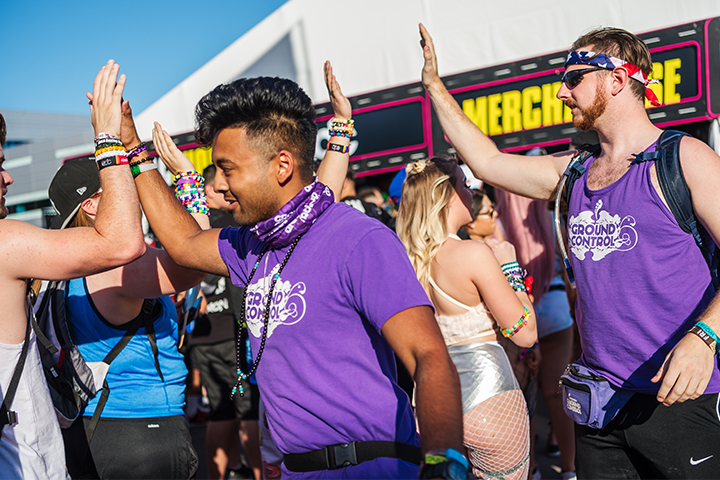
“The majority of the job is keeping the vibes up, to be honest,” explained one Ground Control member I’d met on Saturday afternoon. “Every once in a while, something serious might happen, and you need to escalate the situation. But morale seems to be the primary role we play.”
This notion that security and safety operations can be layered—“like an onion,” as Laura would describe it—is a central tenant to the organization’s effectiveness. Ground Control is on the frontlines, dealing with fans on a peer-to-peer level, which—despite the security and police force’s eagerness to humanize their presence—isn’t achievable by uniformed authority.
“They’re a tremendous help to the operations,” said a Las Vegas police officer who requested to remain anonymous. “Having these compassionate fans on the frontlines, looking out for everyone and escalating problems where necessary, makes our job a lot easier, and it is definitely making the safety operation considerably more effective.”
As well as looking out for the well-being of Headliners, Ground Control acts as a support network of sorts for its own members, tending to attract people who are lost and in search of the North Star.
“During training, we’re very blatant about how we’re here for the new Ground Control members to talk about whatever they want to talk about,” Laura explains. “People come up to us every time and share their feelings, and talk to us about what’s troubling them. A lot of our team members are here looking for community, too, and they need emotional support.”
When asked what this experience of organized, engaged compassion brings to the young people that join the team, Laura pauses for a moment and narrows her eyes.
“It’s resilience,” she says. “A lot of people will take these skills that they learn out there on the Speedway and apply them to their everyday life. Some of them come here, and they might not know which direction they want to take their life in, and by the end of the weekend, they’ll know.”

